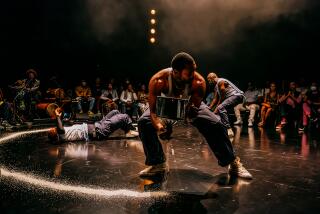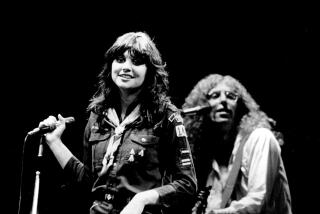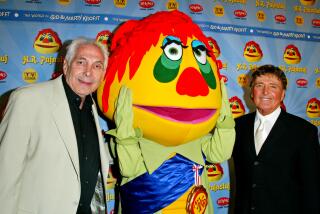THE KARAMAZOVS FLY BACK TO L.A.
Bring your cheeses, your water balloons and your frogs: The Flying Karamazov Brothers are back in town.
Tonight, the quintet comes to the Doolittle in “Juggle and Hyde,” a collection of comedy and circus feats, ending with an audience-participation number in which the Brothers attempt to earn their standing ovation by successfully juggling objects “heavier than one ounce, not heavier than 10 pounds and no bigger than a bread box.”
“Even when we were doing Shakespeare (“The Comedy of Errors,” which they performed here as part of the 1984 Olympics Arts Festival) in New York, people showed up with buckets of squid,” Howard Patterson said. “It’s tough, because we do it for an ovation, and if I lose, I get hit with a pie in the face. For the first 500 or so times, that ignominy used to be upsetting. Now I’ve lost any vestiges of dignity. It only gets in the way.”
Patterson still isn’t sure how he ended up in this business. “I was supposed to be a biologist,” he said ruefully. “It never occurred in my wildest dreams to be an entertainer.” Nevertheless, he had taught himself to juggle--with walnuts--and, after hooking up with college dorm-mate Paul Magid (“He thought I was an effete snob; I thought he was a barbarian”), the duo started performing as an act.
Soon afterward, technical director Timothy Furst and Randy Nelson came aboard, and, after college, the group moved to San Francisco, where between clubs, fairs and streets, “we basically starved for a winter,” Patterson recalled.
Magid also remembers the early, hustling days. “When you’re performing on the street, the people going by are taken by surprise; they’re not expecting to give you money. So you have to form a bond that’s quick and strong. I like that excitement. But since we started opening plays, we find being in a theater a lot easier to connect with an audience. They’re waiting to see you. They want you to succeed. And there’s much more control.”
He also enjoys touring, which has become a nine-month-a-year feature of Karamazov life. “I always had romantic visions of being on the road. When we started, it was actually quite wonderful, living the life of modern-day troubadours. We still do, but it’s a little more formal.” Indeed, priorities have changed. Many of the members are now married and raising families. (Sam Williams joined in 1982, when Nelson took a paternity leave.)
In spite of occasional solo ventures and the inevitable “worn (emotional) paths,” Magid believes in the group’s staying power--specifically because they are a group.
“No human being ever accomplished anything alone,” stressed Nelson. “When we started juggling in college, we found it was fun. Juggling with someone else was even more fun. The feedback is amazing, and one of the most human-amplifying aspects of what we do. We’re a company. It takes all five of us to make one good performer. And each of us has his specialties. I’m probably the best ad-libber. Sam is the best clown. Howard is unmatched in juggling crazy things. Paul can catch anything. And nobody--except Harpo--can twinkle like Tim on stage.”
In the last few years, they’ve appeared in a big-budget movie (“Jewel of the Nile”)--and gone from unknowns to well-knowns. “The last thing we ever want is popularity,” Nelson said. “All that does is use you up. We just want to sneak around, have fun, please audiences. It’s the process of doing, being creative. But I can’t romanticize this stuff too much. It’s just my job.”
A description of the goods for the uninitiated? “What we do is very broad, very different from the present-day theater of realism, very based on ourselves,” Williams said. “It’s juggling and funny stuff, singing and dancing and I dare say, acting. This show has a lot to do with music, creating music through juggling. One piece is a Bach invention played on a marimbaphone, played as the mallets are juggled. We also have back drums--built into a harness on the knees, shoulders and back--and a suit we invented, with electronic signals that trigger a drum machine.”
As for their curious moniker, “It started when we were going to the world’s fair and needed a name to perform under,” Timothy Furst explained. “Howard was reading ‘The Brothers Karamazov’ at the time, and saw a lot of similarities between those characters and our own--and the Flying Santini Brothers.” Any resistance to the name? “Sometimes we are referred to as ‘The Brothers Karamazov,’ ” he noted, “which I’m sure has Dostoevsky turning over in his grave.”
More to Read
The biggest entertainment stories
Get our big stories about Hollywood, film, television, music, arts, culture and more right in your inbox as soon as they publish.
You may occasionally receive promotional content from the Los Angeles Times.










